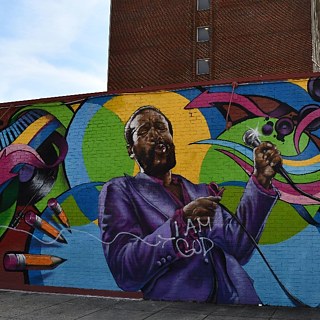Goethe Intern
A Divided Land

It is an interesting yet nerve-racking time to come to Washington, DC. Our communications intern Lara reports on the influence recent politics have had on her daily life in the US.
Admittedly, it is not the most popular time to travel to America. Every day we hear new shocking reports about a president who is dividing the nation. And he is dividing the land, in the truest sense of the word.
I live in Virginia, which is officially a Republican state, yet I find myself moving in liberal circles here thanks to my proximity to Washington, DC, a Democratic stronghold. My first encounter in America was with a Syrian Uber driver who asked me to thank Germany and Merkel for their openness. One of the first questions I was asked by Nancy, my retiree host, and her good friend Keith, was whether Germans knew that half of all Americans had not voted for Trump. When saying the word “Trump”, they made a face that expressed a great deal of frustration, and even some shame.
However, even in my liberal filter bubble, I am unable to ignore the reality of life here. On President’s Day, a national holiday, I visited one of Washington’s many free museums. During an impressive audiovisual tour of the National Museum of African American History and Culture, I followed black history from the beginning of slavery to Obama’s presidency.
However, when boarding the evening bus from the Pentagon to Alexandria, my head still full of thoughts about the museum, I witnessed something that was particularly painful given what I had experienced that day. The nation’s real security emergency is not the lack of a wall, but something that takes place right before our eyes: undiluted racism. An older man with a long beard, clearly drunk, boarded the same bus as me and in a loud voice began verbally abusing women in the front seats. The African-American bus driver asked him to calm down. The man responded by repeatedly yelling, “I ain’t gonna let a black guy tell me what to do,” with disdainful emphasis placed on the word “black”. After initially appearing uncomfortable, the bus driver remained quiet and ignored the man’s behavior. I found myself wondering how often he suffers through such encounters. Sadly, Trump has given such racists a license to make comments of this kind without fear of any consequences. A similar incident would have caused quite a stir in North Frisia, but here people tolerate it with an alarming indifference.
That said, these are problems that have always been simmering away beneath the surface. War veteran Keith explains: “Whereas Germany has processed and critically engaged with its past through a comprehensive culture of remembrance, America’s history is not shared and, to this day, has not been resolved. Right from the start, we have been a divided land.” It’s true: Trump fan merchandise is sold in tourist areas, while buildings in more multicultural districts are coated in anti-Trump graffiti. While the White House may be the president’s home, the capital is mostly Democratic. Trump does not fit in here, in a city that attracts musicians, artists, and Democrats of all colors and nationalities, yet he won the majority of the votes in the neighboring state of Virginia.
The epitome of this split is in the media: while Fox News reports on “the best unemployment rate of all time”, CNN and MSNBC spend 24 hours a day discussing the latest escapades in the White House. As there is no shortage of controversy, there is a constant stream of “breaking news” about Trump from morning till night–pure sensationalist journalism. As a result, the reporting is alarmingly one-sided. Brexit? Venezuela? Merkel? The kind of broad reporting of news stories from around the world that I am familiar with from the Tagesschau, a German TV news broadcast, or the Nordfriesland Tageblatt, a newspaper at home, is hard to find here. Living in Washington is like living in an American filter bubble.
On the other hand, Keith explains, there is a new awakening. Many Americans are tired of their own politics. “I love my country, but we should take a look around us,” is how Barbara, a friend of Nancy, summed it up. People are searching for truth and more information with respect to history and the American identity. People demonstratively read the Washington Post and The New York Times–Democratic newspapers–in the subway. Visitors have to order tickets in advance for the National Museum of African American History and Culture. Americans are becoming actively engaged again, helping refugees and protesting against gun laws. It probably won’t be an easy path, but there is certainly reason to hope for a liberal future for America. So although it may not be a popular moment to travel to America, it is nonetheless an important and fascinating time to experience politics and the way it influences people and their everyday lives.